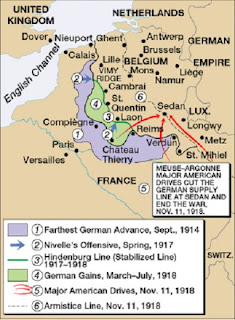The First World War, also known as the Great War, was a world conflict occurring from 1914 to 1918. No previous conflict had mobilized so many soldiers or involved so many in the field of battle. Never before had casualties been so high. Chemical weapons were used for the first time, the first mass bombardment of civilians from the sky was executed, and some of the century's first large-scale civilian massacres took place. Four dynasties, the Habsburgs, the Romanovs, the Ottomans and the Hohenzollerns, who had roots of power back to the days of the Crusades, all fell after the war.

World War I proved to be the decisive break with the old world order, marking the final demise of absolutist monarchy in Europe. It would prove the catalyst for the Russian Revolution, which would inspire later revolutions in countries as diverse as China and Cuba, and would lay the basis for the Cold War standoff between the Soviet Union and the United States. The defeat of Germany in the war and failure to resolve the unsettled issues that had caused the Great War would lay the basis for the rise of Nazism, and thus the outbreak of World War II in 1939. It also laid the basis for a new form of warfare that relied heavily on technology, and would involve non-combatants in war as never before.World War I became infamous for trench warfare, where huge numbers of troops were confined to trenches and could move little because of tight defenses. This was especially true of the Western Front. Over 9 million died on the battlefield, and nearly that many more on the home front due to food shortages, genocide, and ground combat.





0 comments:
Post a Comment